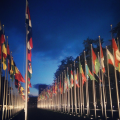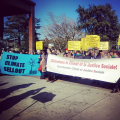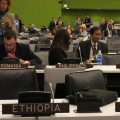56 Days and Back at the UNFCCC
Linh Do | February 9, 2015.
With the dust from COP20 barely settled, but with Paris just around the corner, it’s no surprise that the UN climate change negotiations have resumed sooner rather than later. Despite joking amongst delegates about “what could have possibly changed since Lima”, The Verb is here reporting from Geneva, Switzerland at the first UNFCCC session of the year—ADP2.8.
Geneva will see countries try to resolve where they left the draft negotiating text early Sunday morning in Lima, Peru. Delegates trekked off to Machu Picchu with a text that included many divergent options. Key issues include: what a post-2020 agreement looks like, a shared understanding of ‘common but differentiated responsibilities, and respective capabilities’ in the 21st century and review mechanisms. And that’s just to name a few, but for now, some tidbits from the first day:
– INDCs, intended nationally determined contributions, became the buzzword of choice in late 2014 and it’s one that’s still popular in Geneva. Most submissions, largely from developed countries, on what countries plan to do about climate change are expected by the end of March. Norway is ahead of the game, having released new emission reduction targets for 2030 last Friday.
– Core to Paragraph 4 of the current text is the interplay between adaptation, mitigation and loss and damage. Civil society’s constant reminder to government delegates has been beyond logical: the lower the level of mitigation ambition, the higher the adaptation needs will be. NGOs present are also pushing for the inclusion of language on the phasing out of fossil fuel emissions and phasing in of 100% renewable energy as early as 2050 in the draft text.
– Outside of Geneva, and on a similar vein of thought, finance ministers are meeting in Istanbul, Turkey as part of the financial element of the G20. Discussions will include the topics of climate change and climate finance, unlike last year’s G20 in Australia. This is timely as last week saw a collection of non-profits send a letter to the Turkish G20 President calling on the phase out of fossil fuel subsidies.
– Discussion over the ‘General’ section, C, of the elements paper is underway, with over 240 organisations urging countries here to remember that it’s not just about the numbers but also the people:
“Parties shall, in all climate change-related actions, respect, protect, promote and fulfil human rights for all”.
– Widely under-discussed and poorly understood, the inclusion of the fasting growing emissions source—international aviation and shipping, otherwise known as bunker fuels—in the new climate agreement is still unclear. Combined carbon emissions from international shipping and aviation in 2012 are comparable to the sixth largest emitting country, Germany. Discussion about bunkers are back on the table with the EU mentioning it in their opening statement yesterday.
– The final meetings of the Structured Expert Dialogues (SED) have begun and their task is not an easy one. If recent history has taught us nothing but this, it’s that, unfortunately, no matter how conclusive climate science is, there is still a segment of climate deniers in society preventing action. This week, the SED has two questions to answer: will staying below 2°C to fulfil the aim of the climate convention, and is enough progress being made. The consequences of limited progress are very real, for the planet and its inhabitants.













comment